- Home
- Warhammer 40K
Anarch - Dan Abnett Page 8
Anarch - Dan Abnett Read online
Page 8
‘We… wait here?’ asked Laksheema.
‘I’m sure we can entertain ourselves, ma’am,’ said Hark.
Gaunt led Kolea out of the room. Biota and the other officials were still waiting expectantly outside the ward room. More had joined them, carrying data-slates and reports.
Gaunt could see questions and requests about to explode at him from all sides.
‘Not now,’ he growled.
‘My lord,’ said Sancto. The Scion stiffened as Gaunt turned to look at him.
‘Sancto?’
‘I appreciate this is not the time,’ Sancto said quietly, ‘but there are matters that demand your attention. Many matters. I hesitate to detain you, but–’
Gaunt raised a hand and Sancto shut up.
‘Quickly,’ Gaunt said to the rest of them.
Beltayn shrugged. ‘Oh, just stuff. It can wait, sir,’ he said.
‘You requested my presence, lord,’ said Biota. ‘To form a tactical cabinet and–’
‘I did,’ said Gaunt. ‘I wanted you specifically, Biota.’
‘I’m honoured, sir,’ said Biota. ‘It will be a pleasure to serve. May I introduce–’
He had started to turn to the Tacticae officials with him.
‘No,’ said Gaunt. ‘Not now. Just get to work. Choose effective people you can trust. Triage the data for me. Deal with the stuff that doesn’t need my personal attention. My adjutant Beltayn has been doing your job single-handedly for the last four days, so use him. He can bring you up to speed.’
‘My lord,’ said one of the officers from Van Voytz’s echelon. ‘The lord general wishes you to know that the Beati is inbound to the palace and will be arriving shortly. He thought–’
Gaunt’s hand came up again. He looked at Biota.
‘Things like that, Biota. I’m delegating. Get everything in order. I will, of course, greet the Beati as soon as she’s here.’
‘Of course, sir,’ replied Biota. ‘And, uhm, if there are matters that do require your personal attention…?’
Gaunt sighed, and looked at the faces around him. He pointed to a figure at the back of the group.
‘Along with Beltayn, add her to your cabinet,’ he said. ‘Merity Chass, of House Chass. Well-versed in administrative duties, and entirely familiar with the immediate business of my regiment.’
‘Her?’ said one of the officials, bewildered.
‘Sir,’ said Biota, looking pained, ‘this is entirely unconventional. The personal cabinet of a Lord Executor can’t be thrown together as a makeshift–’
‘We’re improvising today, Antonid,’ said Gaunt. ‘This is just expediency to keep things from leaving the rails. We can refine it all later. For now, get on with it.’
He looked at Merity.
‘Are you all right with this?’ he asked.
‘I will be delighted to have something practical to do, sir,’ she said.
‘But why her?’ asked one of the officials.
Gaunt glared at him. ‘Because she’s the only one of you that could knock on my door and not make me want to shoot them in the face. So use that advantage.’
‘This is highly unorthodox, my lord,’ said Biota.
‘Apparently, that’s my reputation,’ said Gaunt. ‘Run with it and let’s see where it gets us.’
He turned to Kolea.
‘With me,’ he said.
Jan Jerik tapped his fingers on the head of his cane as he waited for the freight elevator to ascend. They could hear it grumbling and clanking its way up from far below.
Corrod stood with him in the dank chamber of the lift-head, a chamber seated deep in the basement crypts of House Ghentethi. They were the last to descend. His men, and those who had arrived with his second, Hadrel, had already gone down, escorted by house footmen and the subordinates of the clave. All told, Corrod’s company numbered sixty-four, all scrawny, emaciated and filthy individuals who had seemed barely able to lift and load the crates of equipment Jan Jerik had provided for them. A singularly unimpressive mob, Jan Jerik concluded. The gear and uniform his people had procured, most of it standard-size trooper fit removed from an abandoned Munitorum depot in Albarppan, wouldn’t fit them. They’d look like children dressing up in adult clothes. Jan Jerik’s disappointment and unease had risen considerably. They were vagabond heathens clad in rags, stooped and bone-thin like the victims of famine, weak and frail. Beggars. They all reminded him of beggars. He hadn’t expected beggars, and he hadn’t asked for them. These wretches wouldn’t be physically able to conclude the endeavour, and he doubted they’d make good on any promises. The deal was sour, and he should never have made it.
Still, the clave’s thermal junction, far below, was quiet and out of the way. A good place to divest himself of this mistake. Five minutes before, he’d spoken quietly with one of his subordinates, out of earshot of his guests. His staff were set and ready. They’d make short work of the business, and dispose of the corpses in the geotherm vents.
Jan Jerik had pulled on a work-suit and protective boots for the descent. He carried a glowglobe set in a lantern holder. When he’d buttoned up the work-suit, he hung his keys and ciphers on the outside.
‘Why do we go last?’ Corrod asked.
Jan Jerik shrugged. ‘Just a custom of the house, sir,’ he said. ‘The ordinate always comes to the workface last, once his crews have prepared the area. A protocol.’
‘Damogaur,’ said Corrod.
‘I’m sorry?’ said Jan Jerik, looking up.
‘You called me “sir”,’ said Corrod. ‘I hold the office of damogaur. That is the correct form of address.’
‘Of course.’
‘A protocol,’ said Corrod.
Jan Jerik smiled thinly. Corrod was watching him. His eyes were dull and lifeless. The weather-beaten skin of his face had shrunk back to every promontory of cheekbone and jaw. His neck was like a reed, and his throat the slack, wrinkled wattle of a nonagenarian.
‘A military rank?’ said Jan Jerik. The elevator finally arrived, rattling into place. He stepped forward and dragged open the folding metal shutter of the cage.
‘Yes,’ said Corrod.
Jan Jerik ushered him into the freight car, and Corrod shuffled past him. The ordinate closed the cage, secured the lock latch, and pulled the lever down to the indicator for the lowest level. With a lurch and a whir of cable gears, the car started its descent.
‘I hadn’t realised,’ said Jan Jerik.
‘What?’
‘That things had gone so badly for… for your forces. I now see why you would be so desperate to engineer a deal with men of, uh, Imperial leanings.’
‘Your leanings seem quite fluid,’ remarked Corrod.
Jan Jerik shrugged. ‘Our loyalty is always to Ghentethi,’ he said. ‘Ghentethi before all. Our house has stood, like many of the dynastic claves, since the early times of settlement. We consider ourselves independent, and ally with those who will benefit us most. My dear s– damogaur. You know well that the mastery of Urdesh has changed many times over the centuries. The Throne, the rimward tribes, and back, and forth. We have worked with and for the Sanguinary Brood as often as we have distant Terra. Indeed, in some golden eras, past gaurs have favoured us more than the Throne or the forge-priests of Mars have ever done.’
The elevator continued to rumble down into the darkness.
‘What did you mean?’ asked Corrod.
‘Mean?’
‘Your comment… that you see now why we are desperate?’
Jan Jerik smiled. ‘Oh, I meant no offence, damogaur,’ he said. ‘Merely an observation. I was expecting warriors. Soldiers. Strong and able men. But your forces are clearly so depleted that they send us old men. Veterans, I presume. I doubt not your courage, but you are a flimsy bunch. Presumably all that could be spared. I am sad to see the migh
t of the tribes so wasted and reduced.’
‘My lord Anarch has sent his best to accomplish this deed,’ said Corrod, without emotion.
Jan Jerik chuckled. ‘Rather my point, damogaur. If you are his best, then woe betide the Anarch’s host. I had heard that the Guard had the measure of you, that the war had swung hard to the Throne on this world, and others. I had no idea that it was quite so parlous. Just dregs remaining. I am surprised the Administratum hasn’t broadcast this jubilantly to raise the public mood. That the Archenemy in these parts is reduced to a tattered relic, and that the fire is gone from them.’
Corrod looked at him almost blankly for a second, then shuffled across the car and threw the lever into neutral. The elevator halted abruptly, between levels. It rocked and creaked gently on its cables.
‘What are you doing, sir?’ Jan Jerik snapped. ‘Have you taken umbrage at my words? Have I offended you? Well, then, forgive my spirit and my honesty. Let us resume.’
Corrod turned to face him.
‘We came to you in guise, ordinate,’ he said. He grimaced slightly, his lips curled back from his dirty teeth for a second, as if suffering some quiet anguish. ‘We entered this city masked, so that we might pass unheeded. You have made a misapprehension.’
The ordinate chuckled, nervously.
‘I crave your pardon, then,’ he said lightly. ‘Let us continue on. The lever, sir–’
‘I wish to reassure you, ordinate,’ said Corrod. He grimaced again.
‘No need, no need! Let us–’
Jan Jerik stopped speaking. His eyes and mouth opened wide, and he took two or three involuntary steps backwards.
Corrod’s eyes had lit. They shone with an ugly yellow light. There was acute intelligence in them now, and a predatory precision. He began to twitch, his thin arms pressed into his ribs, elbows bent, hands spavined into shaking claws. His lips drew back from his teeth in a snarl, and his mouth slowly opened under tension, as if he was screaming silently.
Neon tears began to well and drip from his eyes, the same luminous yellow that glowed inside his sockets. His skin began to ripple. Jan Jerik could see muscle, fibre and bone shift and undulate beneath the surface, bending and poking, twitching and pulsing. He heard a series of ugly cracks, the snap of bones and the click of joints, that made him flinch.
Corrod was growing taller. The weak, slack musculature was filling out and growing taut. Ribs stretched, and vertebrae rattled like beads. The dirty rags he wore tore in places across his shoulders as he grew within them. He tilted his head back in a rictus, mouth wide, spittle flecking from his brown and broken teeth. Neon tears ran from his hollow cheeks. His jaw clicked forwards.
‘The Emperor protects!’ Jan Jerik whispered. His voice shrunk to nothing.
‘No,’ said Corrod. ‘He does not.’
The alchemy was done. Corrod towered over the ordinate, staring down at him. He was more than two metres tall. His limbs were longer. He was still cadaverously lean, a tall, thin spectre, but the muscles were hard under his fat-less flesh. His nose had all but receded into a cavity, and his mouth had extended like a snout, with a long, narrow chin. The teeth, top and bottom, were a tangled mess of canine points, some as long as the ordinate’s little fingers.
Corrod’s neon eyes glowed, yellow heat behind a milky surface.
‘Now you may see us,’ he said.
‘What are you?’ Jan Jerik stammered.
‘We are the Anarch’s chosen of chosen, the blessed reworked, the blessed of his voice, which drowns out all others.’
‘I don’t…’ Jan Jerik gasped.
‘We are his favourite sons. And we are few,’ said Corrod, ‘granted our rare and precious gifts by the holy Changer of Ways through the Ministry of the Great Anarch. We are the Qimurah, and within the Sabbat Worlds, a mere sixty-four of us exist as the Anarch’s elite.’
Corrod paused, wiping a neon tear off his cheek with the back of his thumb.
‘And all of us,’ he said, ‘all sixty-four, in unprecedented unison, have come to perform this task.’
‘I’m sorry!’ said Jan Jerik. ‘I’m sorry!’ He had backed to the far wall of the car in terror, and was pressed against the cage.
‘Apology accepted,’ said Corrod. He reached for the lever. ‘Shall we continue?’
Gaunt led Kolea into his quarters, took one warning look at Sancto and the Scions as they took up position outside, and shut the door.
‘Sit,’ he said.
Kolea breathed heavily, and sat down on one of the chairs.
‘Talk,’ said Gaunt. He crossed to a cabinet and poured two cap glasses of amasec.
Kolea looked like he was in pain. He couldn’t make eye contact.
‘I don’t know where to start, sir,’ he said.
‘Try,’ said Gaunt. He handed one of the glasses to Kolea, who took it carefully, but didn’t sip. Gaunt dragged over another chair and sat down, facing Kolea.
‘Gol?’
Kolea sighed.
‘What has she got on you?’ asked Gaunt.
‘I don’t know. Falsehoods, lies.’
‘She’s making it up?’
‘No. I mean… there are things that I don’t… I don’t even know if they’re true. Things that have haunted me.’
He looked up into Gaunt’s eyes for the first time.
‘Things I should have told you long ago,’ he said.
‘About Aigor? The supply drop?’
‘Mostly. Yes.’
‘Now’s the time, major,’ said Gaunt.
Kolea looked down at his drink. He paused, then he sank it in one gulp.
‘There was something there,’ he said.
‘You told me that. It was in your report.’
‘A voice, that demanded the eagle stones.’
Gaunt nodded.
‘Demanded they be brought to Urdesh.’
‘All this I know, Gol.’
‘It said it was the voice of… of him. Sek. It said it had power over me.’
‘To deliver the stones?’
Kolea hunched his shoulders. ‘We brought them anyway,’ he said. ‘To Urdesh, I mean. It’s what we were doing. It’s not like I had to steal them, or break orders, or do its bidding…’
‘And this was all in your report, Gol. So what has Laksheema got hold of? What didn’t you tell me?’
‘It said I was marked,’ said Kolea, his voice thin. ‘It knew my name, and said I was… susceptible. That the harm done to me on… the injuries that were healed on Herodor, that they had made me vulnerable.’
‘To Sek?’
‘To the warp. Throne help me. The voice told me I was… I was a conduit for daemons.’
He looked up at Gaunt.
‘How can a man say that? It damns him. It walks him to the scaffold or the stake.’
‘Probably better to say it than to hide it, Gol. This is late to learn it.’
‘I know!’ Kolea snapped. He subsided. ‘I know. But I told myself… I told myself it was all lies. Sir, we both know how the Ruinous Powers game us. Play with our minds. Whispering and polluting. I thought it was that. The warp trying to… to play me.’
‘So your report was incomplete because you were protecting yourself?’ asked Gaunt.
‘No,’ said Kolea, in the tiniest whisper.
‘What, then?’
‘The voice told me that if I didn’t comply, it would kill my children.’
‘Your children?’
‘Dalin and Yoncy. It told me they’d perish, if…’
Gaunt nodded. ‘They’re safe, you know?’ he said. ‘Both of them. They got here safely. It was lying to you.’
‘It’s what I thought.’
‘But what? Gol?’
Kolea sighed again.
‘It’s like I don’t kno
w what to trust any more. I thought it was my head, the old damage… so many things that don’t make sense. I just locked it all up. Kept it to myself.’
Kolea rose to his feet abruptly. He fiddled with his empty glass, as if wondering where to put it down.
‘I thought if I told you, you’d execute me,’ he said. ‘That, or the Black Ships. And the kids too, by extension. Named by the darkness. Feth, what? The Black Ships for them too?’
‘So you told yourself it was all lies?’ asked Gaunt.
‘Yes,’ Kolea replied. ‘But I made a promise to myself. An oath, that I’d keep the children safe. Protect them. That if this darkness, this bad shadow, was real, I’d deny it and kill it. That’s what we do. We’re soldiers of the Throne.’
He looked at Gaunt.
‘Aren’t we?’ he asked.
‘We are,’ said Gaunt.
‘But it was getting too… too hard,’ Kolea said. ‘Spinning out of control. Just so much. Once Laksheema got her claws in me, I knew it was just a matter of time. That it would all come out.’
Gaunt got up, took the glass from Kolea’s hand, and went to refill it.
‘We didn’t know what the eagle stones were, Gol,’ he said. ‘Not back then. Not at Aigor. It was much later we made that connection. Bask saw them after the accident. Spread out like wings.’
‘Yeah,’ said Kolea. ‘That’s when it all really started to unravel. Sir, I should have told you right at the start, damn the consequences. I was a coward.’
Gaunt held out the refilled glass. ‘You’re one of the strongest men I’ve ever served with, Gol,’ he said. ‘Whatever you are, you’re no coward.’
‘What happens now, sir?’ Kolea asked. ‘I’ll resign my pins. You’ll want me in the stockade at least.’
Gaunt wiggled the glass he was holding out slightly, reminding Kolea to take it.
‘What happens now, Gol,’ he said, ‘is you tell me the rest.’
‘The rest?’
‘What started to unravel?’
Kolea took the glass. ‘Have you heard…’ He began, then winced as if he couldn’t believe he was saying it out loud. ‘Have you heard the rumours? About Yoncy?’
‘Rumours?’ asked Gaunt.
‘I thought Dalin and Yoncy were dead and gone with Livy on Verghast,’ Kolea said. ‘Lost and gone. But then, like a miracle, it turns out Criid had saved them. Brought them into the fold. Raised them.’

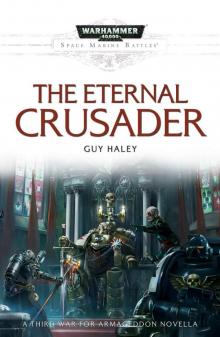 The Eternal Crusader - Guy Haley
The Eternal Crusader - Guy Haley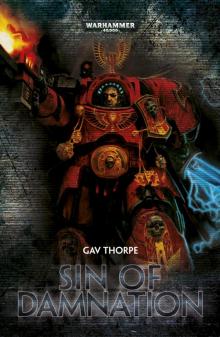 Sin of Damnation - Gav Thorpe
Sin of Damnation - Gav Thorpe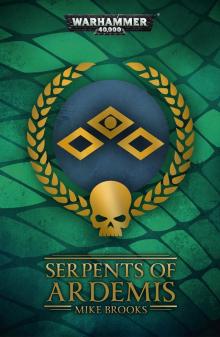 Serpents of Ardemis - Mike Brooks
Serpents of Ardemis - Mike Brooks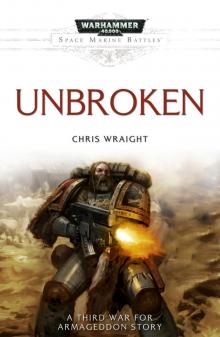 Unbroken - Chris Wraight
Unbroken - Chris Wraight Last Flight - Edoardo Albert
Last Flight - Edoardo Albert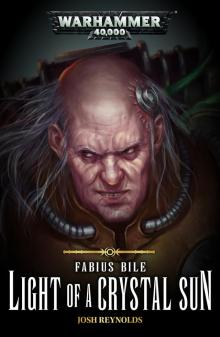 Light of a Crystal Sun - Josh Reynolds
Light of a Crystal Sun - Josh Reynolds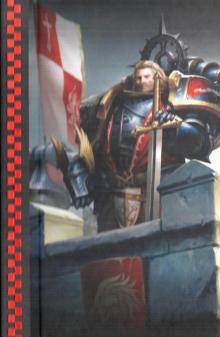 Lion El'Jonson- Lord of the First - David Guymer
Lion El'Jonson- Lord of the First - David Guymer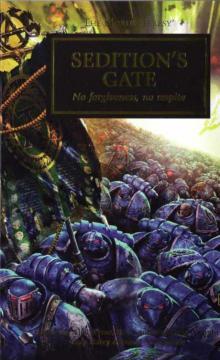 Sedition's Gate - Nick Kyme & Chris Wraight
Sedition's Gate - Nick Kyme & Chris Wraight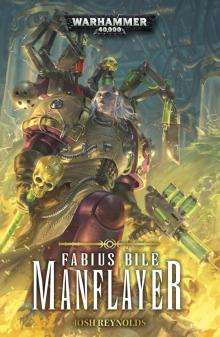 Manflayer - Josh Reynolds
Manflayer - Josh Reynolds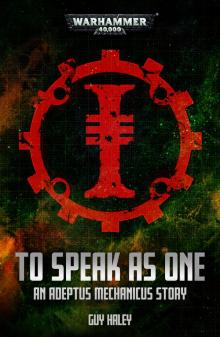 To Speak as One - Guy Haley
To Speak as One - Guy Haley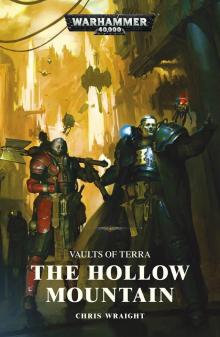 Vaults of Terra- The Hollow Mountain - Chris Wraight
Vaults of Terra- The Hollow Mountain - Chris Wraight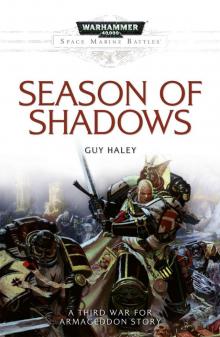 Season of Shadows - Guy Haley
Season of Shadows - Guy Haley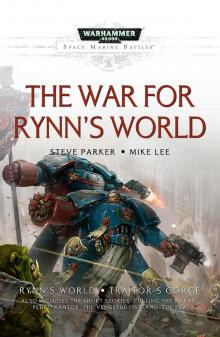 The War for Rynn's World - Steve Parker & Mike Lee
The War for Rynn's World - Steve Parker & Mike Lee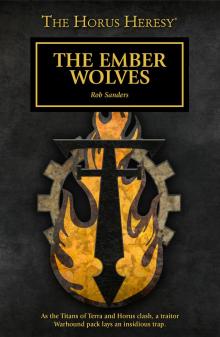 The Ember Wolves - Rob Sanders
The Ember Wolves - Rob Sanders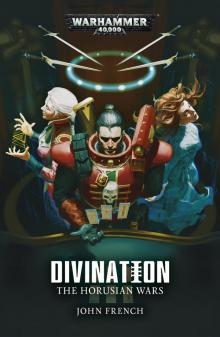 Divination - John French
Divination - John French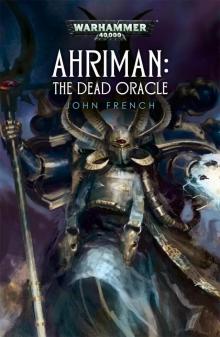 The Dead Oracle - John French
The Dead Oracle - John French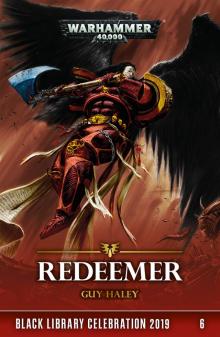 Redeemer - Guy Haley
Redeemer - Guy Haley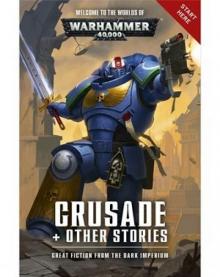 Crusade & Other Stories - Dan Abnett Et Al.
Crusade & Other Stories - Dan Abnett Et Al.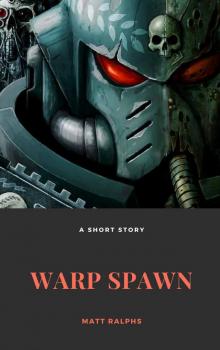 Warp Spawn - Matt Ralphs
Warp Spawn - Matt Ralphs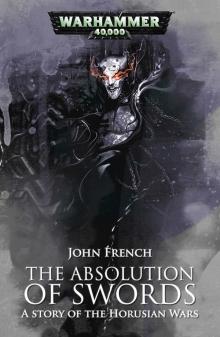 The Absolution of Swords - John French
The Absolution of Swords - John French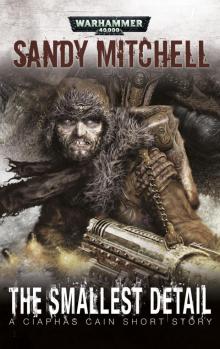 The Smallest Detail - Sandy Mitchell
The Smallest Detail - Sandy Mitchell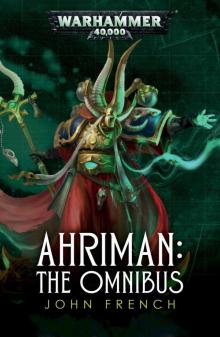 The Omnibus - John French
The Omnibus - John French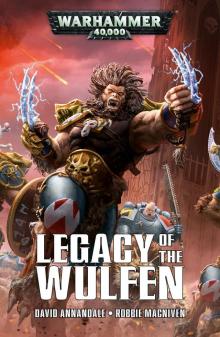 Legacy of the Wulfen - David Annandale & Robbie MacNiven
Legacy of the Wulfen - David Annandale & Robbie MacNiven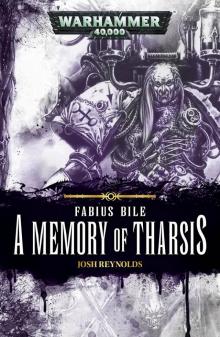 A Memory of Tharsis - Josh Reynolds
A Memory of Tharsis - Josh Reynolds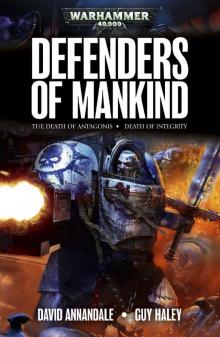 Defenders of Mankind - David Annandale & Guy Haley
Defenders of Mankind - David Annandale & Guy Haley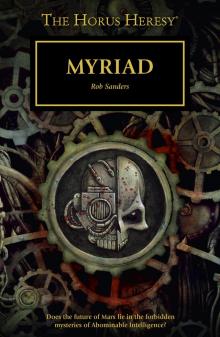 Myriad - Rob Sanders
Myriad - Rob Sanders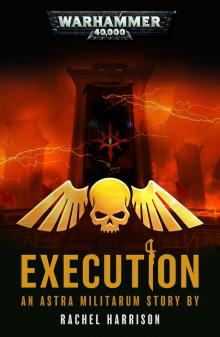 Execution - Rachel Harrison
Execution - Rachel Harrison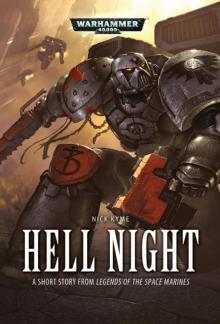 Hell Night - Nick Kyme
Hell Night - Nick Kyme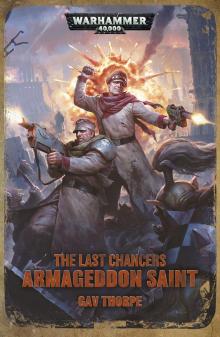 Armageddon Saint - Gav Thorpe
Armageddon Saint - Gav Thorpe On Wings of Blood
On Wings of Blood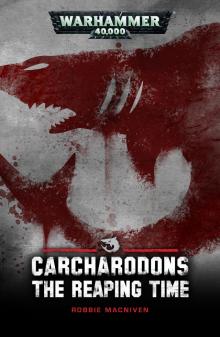 The Reaping Time - Robbie MacNiven
The Reaping Time - Robbie MacNiven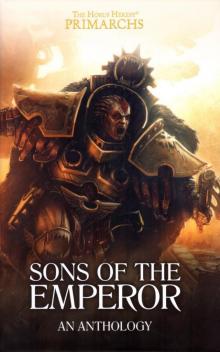 Sons of the Emperor
Sons of the Emperor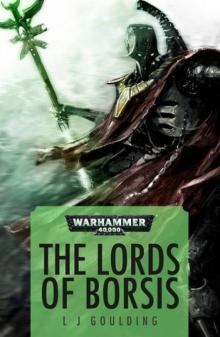 The Lords of Borsis - L J Goulding
The Lords of Borsis - L J Goulding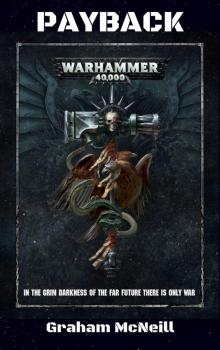 Payback - Graham McNeill
Payback - Graham McNeill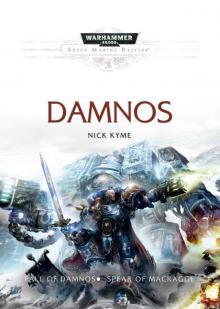 Damnos - Nick Kyme
Damnos - Nick Kyme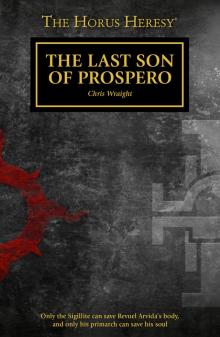 The Last Son of Prospero - Chris Wraight
The Last Son of Prospero - Chris Wraight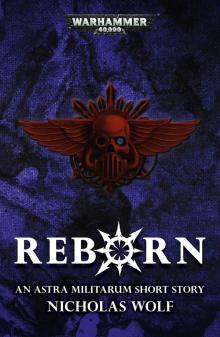 Reborn - Nicholas Wolf
Reborn - Nicholas Wolf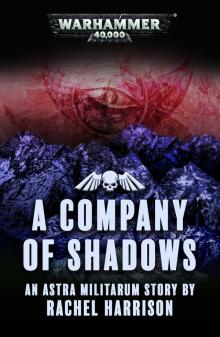 A Company of Shadows - Rachel Harrison
A Company of Shadows - Rachel Harrison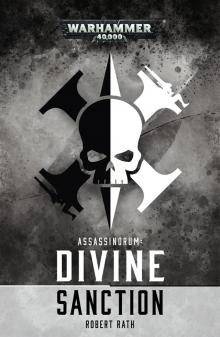 Assassinorum- Divine Sanction - Robert Rath
Assassinorum- Divine Sanction - Robert Rath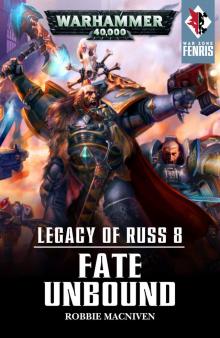 Fate Unbound - Robbie MacNiven
Fate Unbound - Robbie MacNiven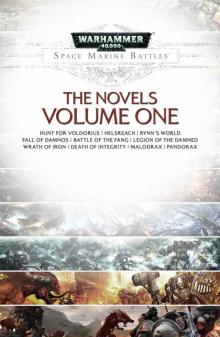 Space Marine Battles - the Novels Volume 1
Space Marine Battles - the Novels Volume 1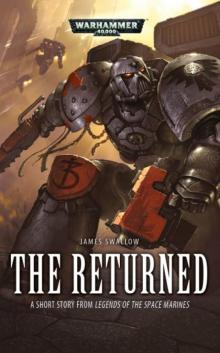 The Returned - James Swallow
The Returned - James Swallow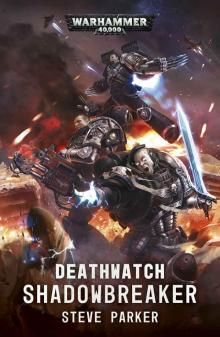 Shadowbreaker - Steve Parker
Shadowbreaker - Steve Parker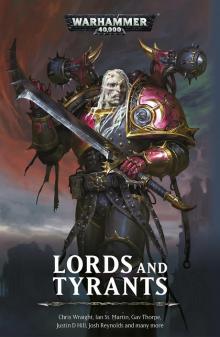 Lords and Tyrants
Lords and Tyrants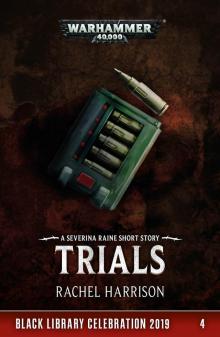 Trials - Rachel Harrison
Trials - Rachel Harrison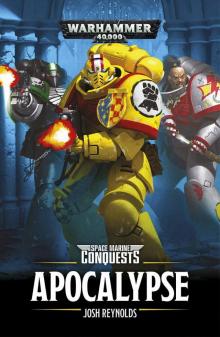 Apocalypse - Josh Reynolds
Apocalypse - Josh Reynolds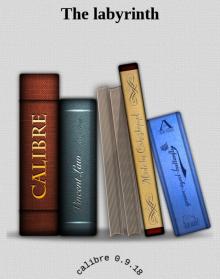 The labyrinth - Richard Ford
The labyrinth - Richard Ford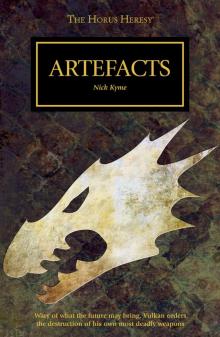 Artefacts - Nick Kyme
Artefacts - Nick Kyme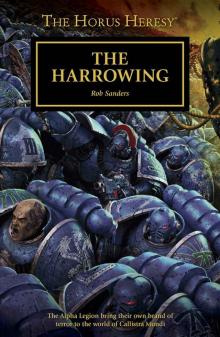 The Harrowing - Rob Sanders
The Harrowing - Rob Sanders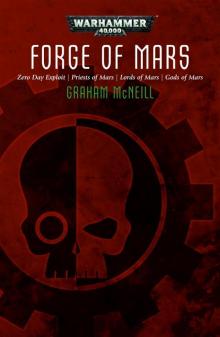 Forge of Mars - Graham McNeill
Forge of Mars - Graham McNeill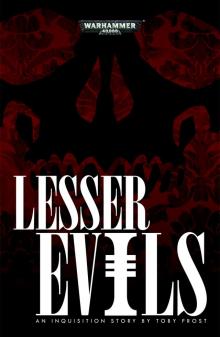 Lesser Evils - Toby Frost
Lesser Evils - Toby Frost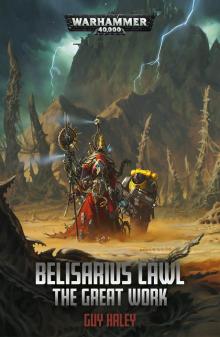 Belisarius Cawl- the Great Work - Guy Haley
Belisarius Cawl- the Great Work - Guy Haley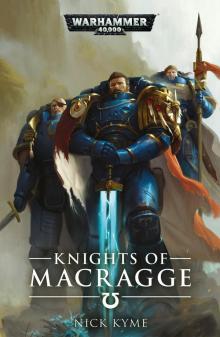 Knights of Macragge - Nick Kyme
Knights of Macragge - Nick Kyme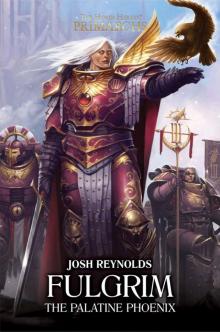 Fulgrim- The Palatine Phoenix - Josh Reynolds
Fulgrim- The Palatine Phoenix - Josh Reynolds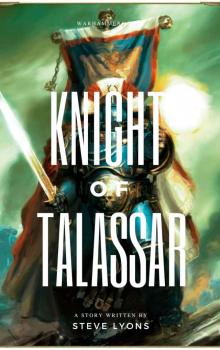 Knight of Talassar - Steve Lyons
Knight of Talassar - Steve Lyons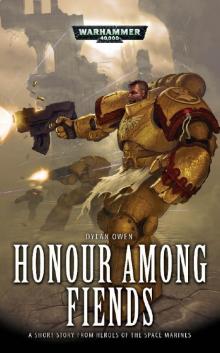 Honour Among Fiends - Dylan Owen
Honour Among Fiends - Dylan Owen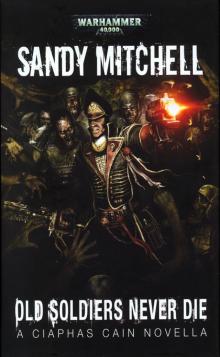 Old Soldiers Never Die - Sandy Mitchell
Old Soldiers Never Die - Sandy Mitchell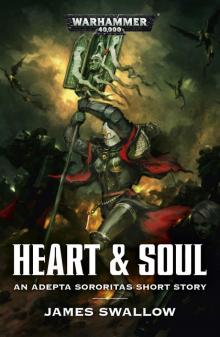 Heart & Soul - James Swallow
Heart & Soul - James Swallow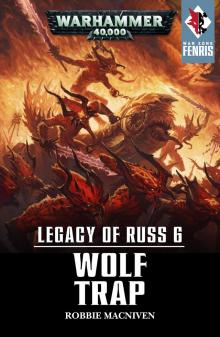 Wolf Trap - Robbie MacNiven
Wolf Trap - Robbie MacNiven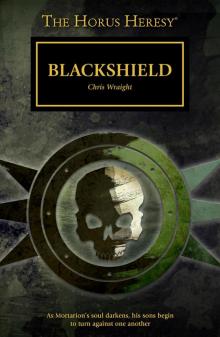 Blackshield - Chris Wraight
Blackshield - Chris Wraight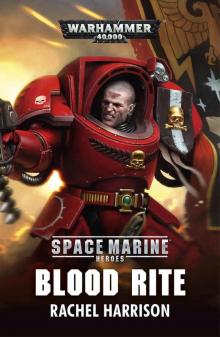 Blood Rite - Rachel Harrison
Blood Rite - Rachel Harrison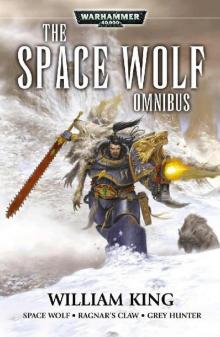 The Space Wolf Omnibus - William King
The Space Wolf Omnibus - William King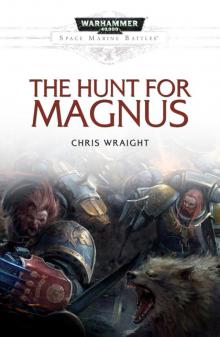 The Hunt for Magnus - Chris Wraight
The Hunt for Magnus - Chris Wraight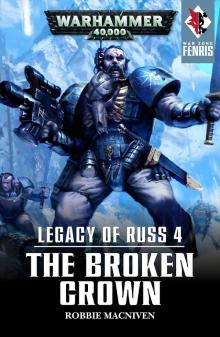 The Broken Crown - Robbie MacNiven
The Broken Crown - Robbie MacNiven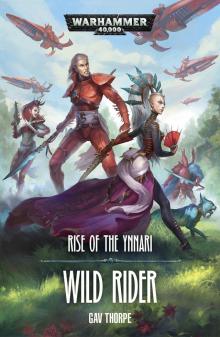 Wild Rider - Gav Thorpe
Wild Rider - Gav Thorpe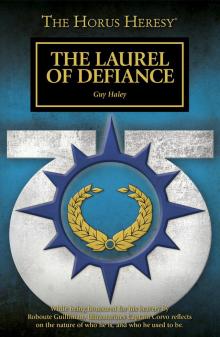 The Laurel of Defiance - Guy Haley
The Laurel of Defiance - Guy Haley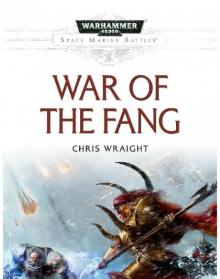 War of the Fang - Chris Wraight
War of the Fang - Chris Wraight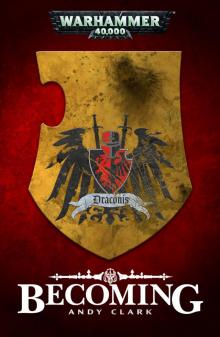 Becoming - Andy Clark
Becoming - Andy Clark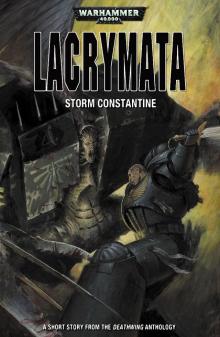 Lacrymata - Storm Constantine
Lacrymata - Storm Constantine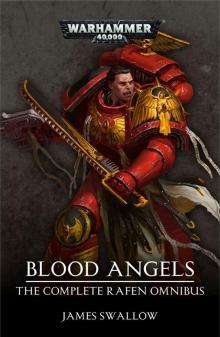 Blood Angels - The Complete Rafen Omnibus - James Swallow
Blood Angels - The Complete Rafen Omnibus - James Swallow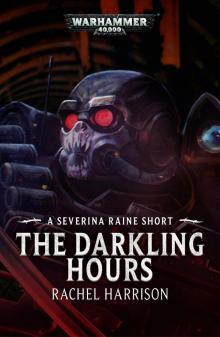 The Darkling Hours - Rachel Harrison
The Darkling Hours - Rachel Harrison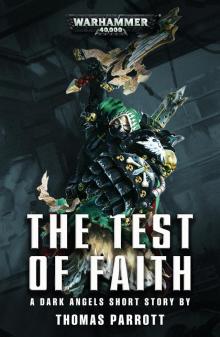 The Test of Faith - Thomas Parrott
The Test of Faith - Thomas Parrott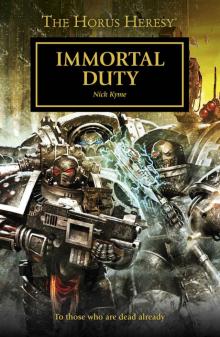 Immortal Duty - Nick Kyme
Immortal Duty - Nick Kyme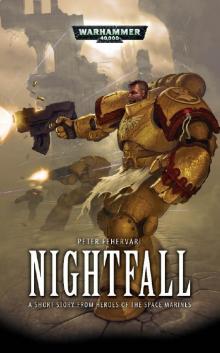 Nightfall - Peter Fehervari
Nightfall - Peter Fehervari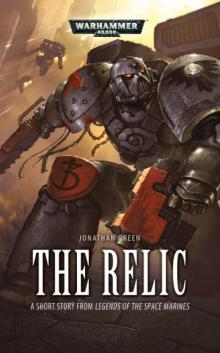 The Relic - Jonathan Green
The Relic - Jonathan Green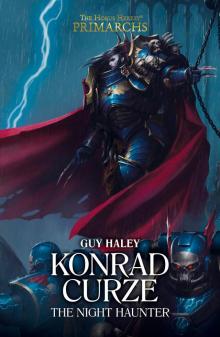 Konrad Curze the Night Haunter - Guy Haley
Konrad Curze the Night Haunter - Guy Haley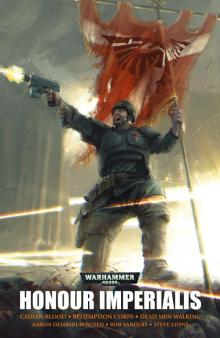 Honour Imperialis - Aaron Dembski-Bowden
Honour Imperialis - Aaron Dembski-Bowden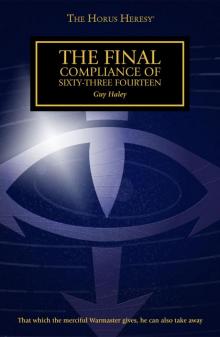 The Final Compliance of Sixty-Three Fourteen - Guy Haley
The Final Compliance of Sixty-Three Fourteen - Guy Haley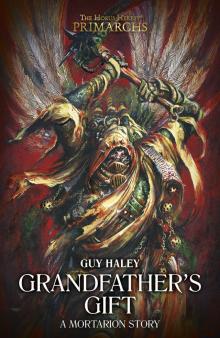 Grandfather’s Gift - Guy Haley
Grandfather’s Gift - Guy Haley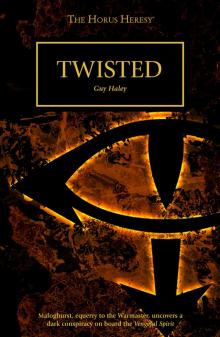 Twisted - Guy Haley
Twisted - Guy Haley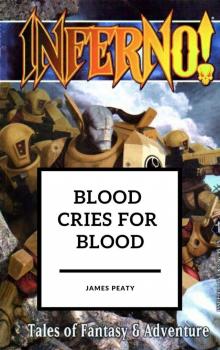 Blood Cries for Blood - James Peaty
Blood Cries for Blood - James Peaty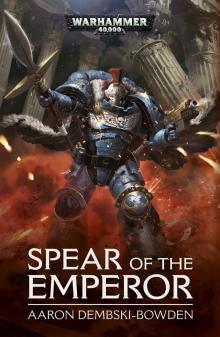 Spear of the Emperor - Aaron Dembski-Bowden
Spear of the Emperor - Aaron Dembski-Bowden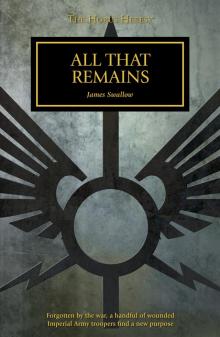 All That Remains - James Swallow
All That Remains - James Swallow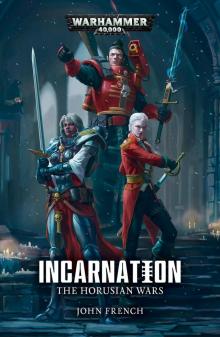 Incarnation - John French
Incarnation - John French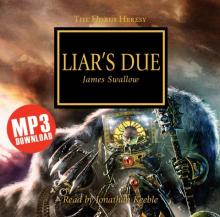 Liar's Due - Ben Swallow
Liar's Due - Ben Swallow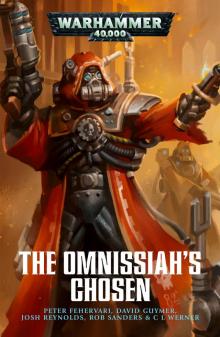 The Omnissiah's Chosen - Peter Fehervari
The Omnissiah's Chosen - Peter Fehervari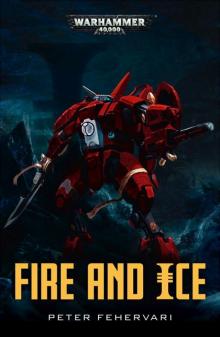 Fire and Ice - Peter Fehervari
Fire and Ice - Peter Fehervari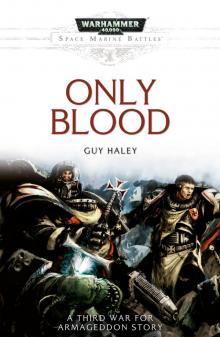 Only Blood - Guy Haley
Only Blood - Guy Haley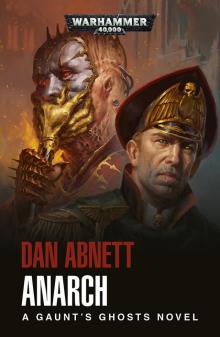 Anarch - Dan Abnett
Anarch - Dan Abnett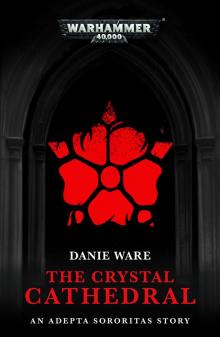 The Crystal Cathedral - Danie Ware
The Crystal Cathedral - Danie Ware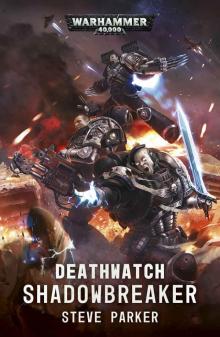 Shadowbreaker
Shadowbreaker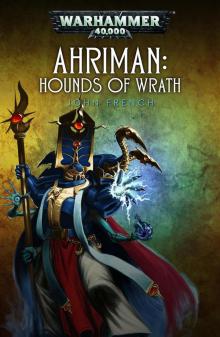 Hounds of Wrath - John French
Hounds of Wrath - John French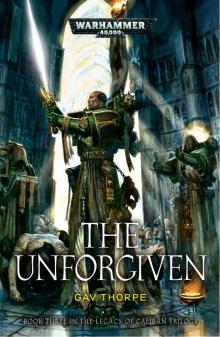 The Unforgiven - Gav Thorpe
The Unforgiven - Gav Thorpe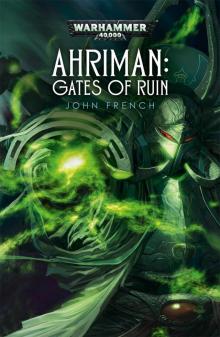 Gates of Ruin - John French
Gates of Ruin - John French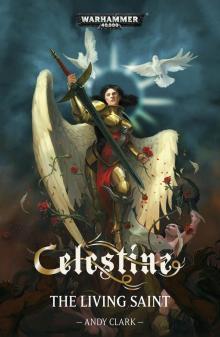 Celestine - Andy Clark
Celestine - Andy Clark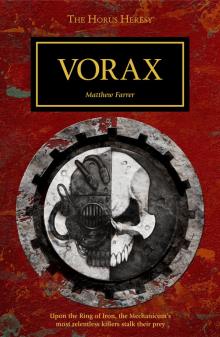 Vorax - Matthew Farrer
Vorax - Matthew Farrer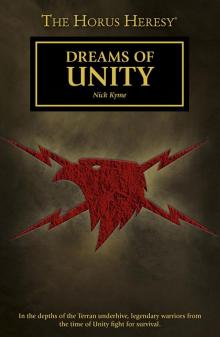 Dreams of Unity - Nick Kyme
Dreams of Unity - Nick Kyme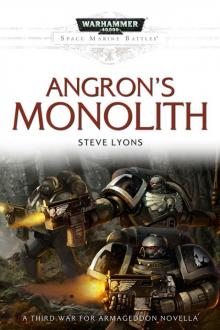 Angron's Monolith - Steve Lyons
Angron's Monolith - Steve Lyons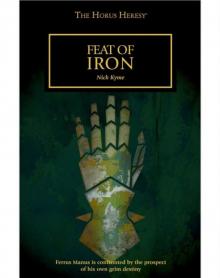 Feat of Iron - Nick Kyme
Feat of Iron - Nick Kyme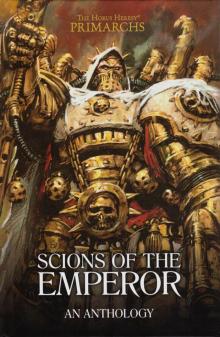 Scions of the Emperor
Scions of the Emperor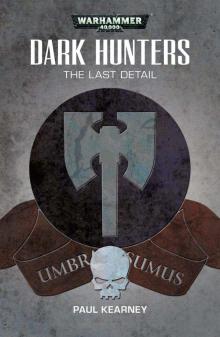 The Last Detail - Paul Kearney
The Last Detail - Paul Kearney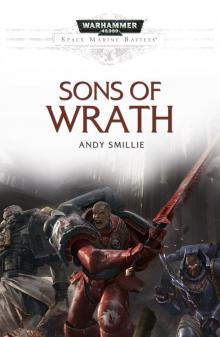 Sons of Wrath - Andy Smillie
Sons of Wrath - Andy Smillie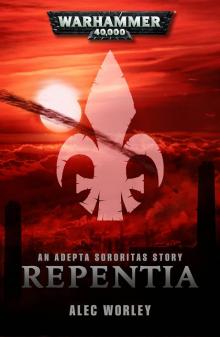 Repentia - Alec Worley
Repentia - Alec Worley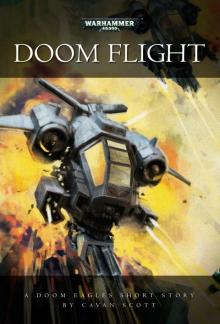 Doom Flight - Cavan Scott
Doom Flight - Cavan Scott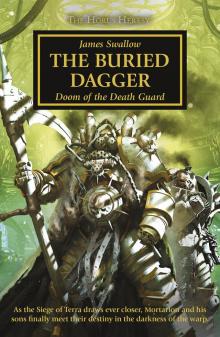 The Buried Dagger - James Swallow
The Buried Dagger - James Swallow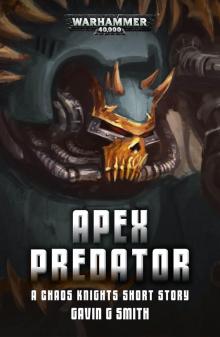 Apex Predator - Gavin G Smith
Apex Predator - Gavin G Smith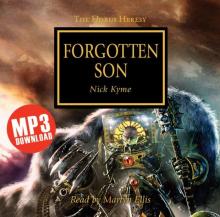 Forgotten Sons - Nick Kyme
Forgotten Sons - Nick Kyme Honourbound - Rachel Harrison
Honourbound - Rachel Harrison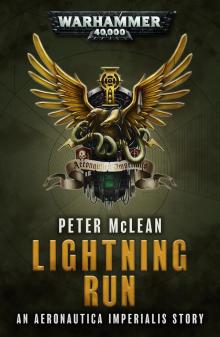 Lightning Run - Peter McLean
Lightning Run - Peter McLean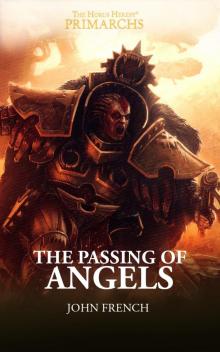 The Passing of Angels - John French
The Passing of Angels - John French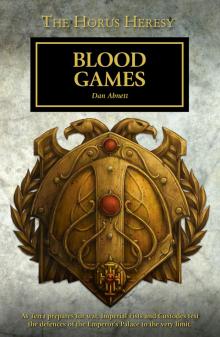 Blood Games - Dan Abnett
Blood Games - Dan Abnett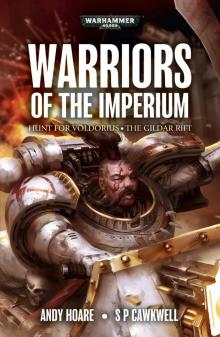 Warriors of the Imperium - Andy Hoare & S P Cawkwell
Warriors of the Imperium - Andy Hoare & S P Cawkwell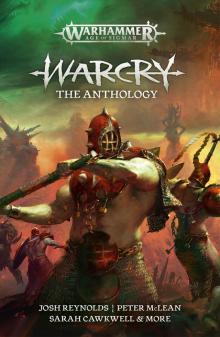 Warcry
Warcry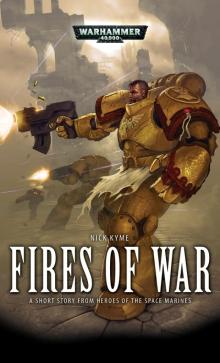 Fires of War - Nick Kyme
Fires of War - Nick Kyme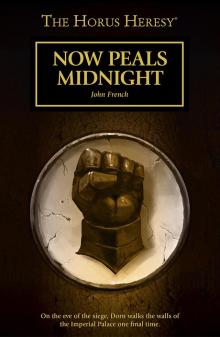 Now Peals Midnight - John French
Now Peals Midnight - John French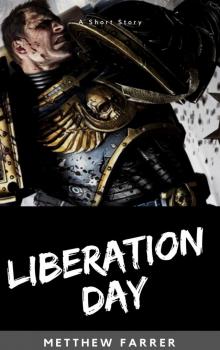 Liberation Day - Matthew Farrer
Liberation Day - Matthew Farrer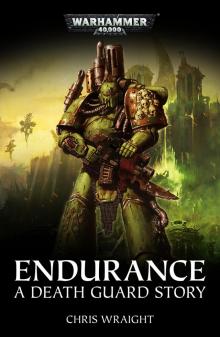 Endurance - Chris Wraight
Endurance - Chris Wraight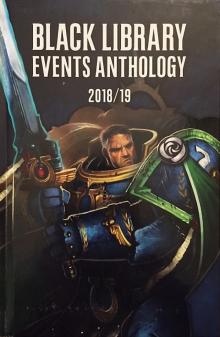 Black Library Events Anthology 2018-19
Black Library Events Anthology 2018-19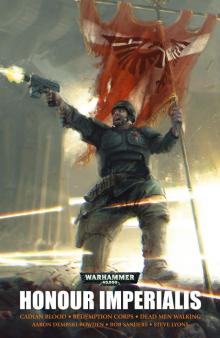 Honour Imperialis - Braden Campbell & Aaron Dembski-Bowden & Chris Dows & Steve Lyons & Rob Sanders
Honour Imperialis - Braden Campbell & Aaron Dembski-Bowden & Chris Dows & Steve Lyons & Rob Sanders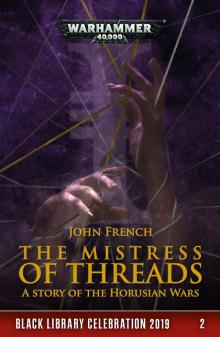 The Mistress of Threads - John French
The Mistress of Threads - John French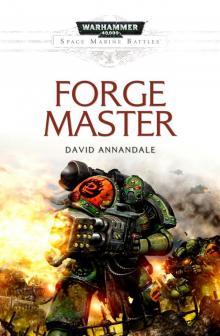 Forge Master - David Annandale
Forge Master - David Annandale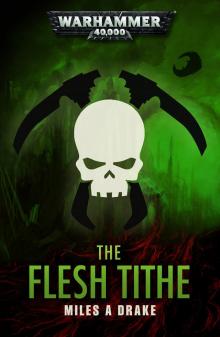 The Flesh Tithe - Miles A Drake
The Flesh Tithe - Miles A Drake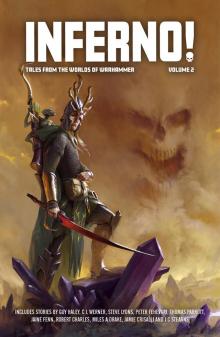 Inferno Volume 2 - Guy Haley
Inferno Volume 2 - Guy Haley Mercy of the Dragon - Nick Kyme
Mercy of the Dragon - Nick Kyme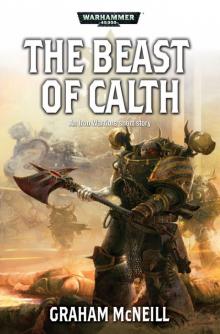 The Beast of Calth - Graham McNeill
The Beast of Calth - Graham McNeill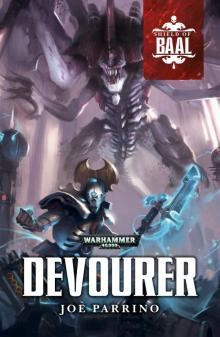 Devourer - Joe Parrino
Devourer - Joe Parrino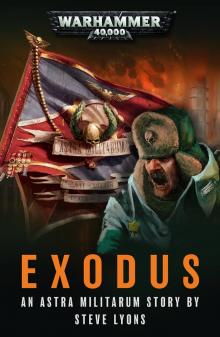 Exodus - Steve Lyons
Exodus - Steve Lyons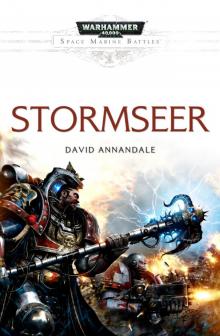 Stormseer - David Annandale
Stormseer - David Annandale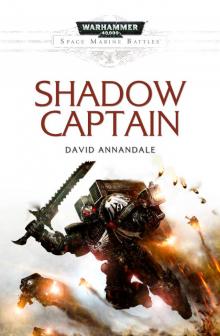 Shadow Captain - David Annandale
Shadow Captain - David Annandale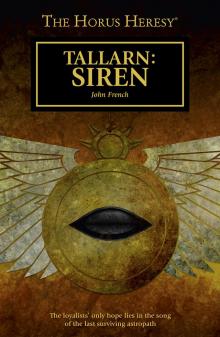 Tallarn- Siren - John French
Tallarn- Siren - John French The Grey Raven - Gav Thorpe
The Grey Raven - Gav Thorpe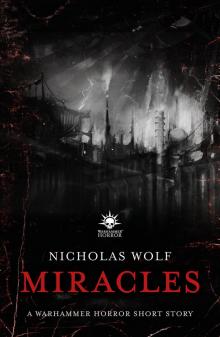 Miracles - Nicholas Wolf
Miracles - Nicholas Wolf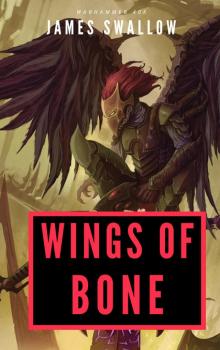 Wings of Bone - James Swallow
Wings of Bone - James Swallow